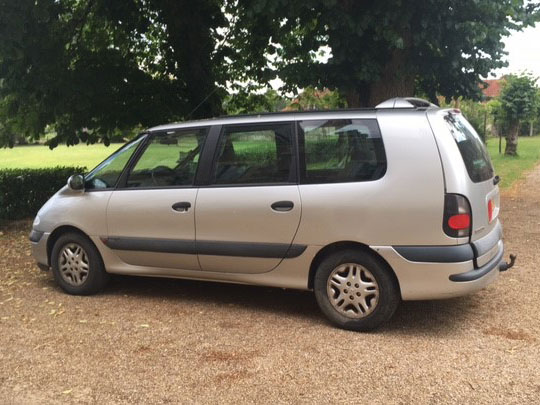POITOU, FRANCE – “You can’t take that car into Paris.”
Our gardener is our source of local news and universal wisdom.
“You don’t have a green sticker,” he explained.
The French are always finding ways to make life expensive, difficult, inefficient, and unproductive. In the latest installment, they have instituted a system that is meant to keep old cars like ours off the streets of the capital.
Banned From the Streets
“It’s just too old and too polluting,” Damien told us.
“They give you a sticker for the windshield. If you have a low-emission, new car, you get a green sticker. If you have a normal car, you get a yellow sticker.
“But for this one, you’d get a black sticker… and you’re not allowed on the streets.”
This was a blow.
We’ve had these wheels – a Renault van, which was very handy when we had five children and a grandmother at home – for 20 years.
The diesel engine never failed us. We were planning to drive up to Paris for meetings on Friday.
 Bill’s decades-old van
Bill’s decades-old van
Now, we will have to take the train. Which is not bad… in theory.
But in practice, the trains are dominated by unionized workers. They still have pictures of Karl Marx or Leon Trotsky on their living room walls… and raise their right fists in salute each time they pass.
They believe it is their duty to inconvenience the bourgeoisie as much as possible. Typically, they go on strike when it will be most disruptive to others… and most agreeable for themselves.
“I don’t know,” Damien went on, “but they’re probably going on strike next week. It’s a big holiday [Bastille Day; America’s president, Donald J. Trump, will join the festivities].
“You won’t be able to get into Paris or out of it. And the railway workers will get an additional day of vacation.”
Another Kind of Setback
We were just getting over that news when Damien delivered another blow…
There are always setbacks in life. There are setbacks we make for ourselves – the fruit of our own bad deals, bad judgment, or bad habits. And there are the setbacks we suffer from nature.
We accept them both as we accept flies and fools… trying only to limit the damage.
Setbacks delivered by nature and chance we take in good grace. If we build our house on the beach, for example, we’re not going to complain when a hurricane floods the living room. We asked for it.
But if the governor closes our beach, citing a “budget issue,” we’re going to be suspicious… and annoyed. Especially if he then uses the beach himself.
In fact, there is an entire category of setbacks – caused by win-lose deals imposed upon us.
For instance, a robber puts a gun to our head. “Your money or your life,” says the well-read thief. And if you could engage him in conversation, you might find plenty of plausible “reasons” for the larceny.
He was abused as a child. He is a member of a disadvantaged minority. He went to public school. He needs the money more than we do. He is only stealing it to give it to the poor.
“Stealing from the rich,” he says, “will reduce wealth inequality. And since we know from reading Stiglitz, Krugman, Piketty, et al. that wealth inequality slows down growth, making everyone poorer, redistributing wealth will make us all better off. I’m just a facilitator. I’m helping to create a fairer society.”
You see immediately that the robber has a future in politics!
“The risks are lower… and the payoff is greater,” you tell him. “And the work is essentially the same – transferring wealth from the people who earn it to the people who are favored by the robber.”
Back-alley stickup men get caught… or shot… from time to time. The politician, almost never.
Instead, he is re-elected… moved from one committee post to a more powerful one… where he is able to redistribute more wealth.
And when he eventually retires, he has a job waiting for him among the plumy cronies – in the think tanks, lobbying firms, or big business.
Rising Damp
Those thoughts in mind, we walked with Damien to look at our gatehouse.

The gatehouse in the French countryside
This is a charming little place. Open fireplace. Gas heat. Original handmade tile floors. Exposed beams.
But it’s empty. And an empty house degrades faster than one that is lived in. Moisture wicks up the stone walls. Rising damp it is called. Soon, there is mold, saltpeter, and peeling paint.
“How come we haven’t rented it?” we asked.
“A couple of people have looked at it. But it’s not up to code.”
“What code? It’s 200 years old…”
“That doesn’t matter,” Damien continued. “There’s a new law. If you want to rent a place, you have to have it inspected to see if it is up to standard.
“You pay… I don’t know… €200, and they certify that it meets code requirements. And you have to do that before each time you rent it. It’s a scam.”
“What would we have to do to this place?”
“Ooh la la! Almost impossible. It has to be fully insulated. You’d have to redo all the walls. Stone walls won’t pass. We would put up sheetrock with insulation.
“And we’d have to rewire the whole place. And put in new double-glazed windows. And find a way to insulate the ceiling. I don’t know how you’d do that without covering up the beams.
“And that staircase – it is too narrow. And the steps aren’t exactly what they are supposed to be.”
Damien pointed to the corner where a little handmade staircase, with steps worn by long use, winds up to the loft bedroom.
“Wouldn’t be worth it. We rent this for €300 a month when we can get a renter. And it would probably cost about €15,000 to bring it up to code. Let’s see. How long would it take to pay that off? I don’t know… 20 years?”
Subsidized Housing
Math is not Damien’s strongest subject.
It would probably take about four years to repay the investment – if the place were rented the whole time. Still, not a terrible investment.
But think of the waste: The house is already comfortable. The way it is used, with an open wood fire, makes insulation less important. And who’s to say that wallboard is a real improvement over stone?
Only the renter can say if he likes it… or wants it… and whether it is worth the rent.
But wait… There’s more:
“It’s not that simple,” Damien explained.
“Almost all the renters get a subsidy from the government, which pays about half the rent. They only get it, though, if they rent an approved place. So they can’t rent here.”
Win-lose. The feds force their vision of proper housing on renters. They subsidize those who go along and punish those who don’t.
Whose idea was this? What politician thought he should dictate to landlords and renters where they could live and where they couldn’t?
We don’t know, but we expect to find him on the board of a real estate inspection firm when he retires from government.
Regards,
![]()
Bill
Category: Economics

